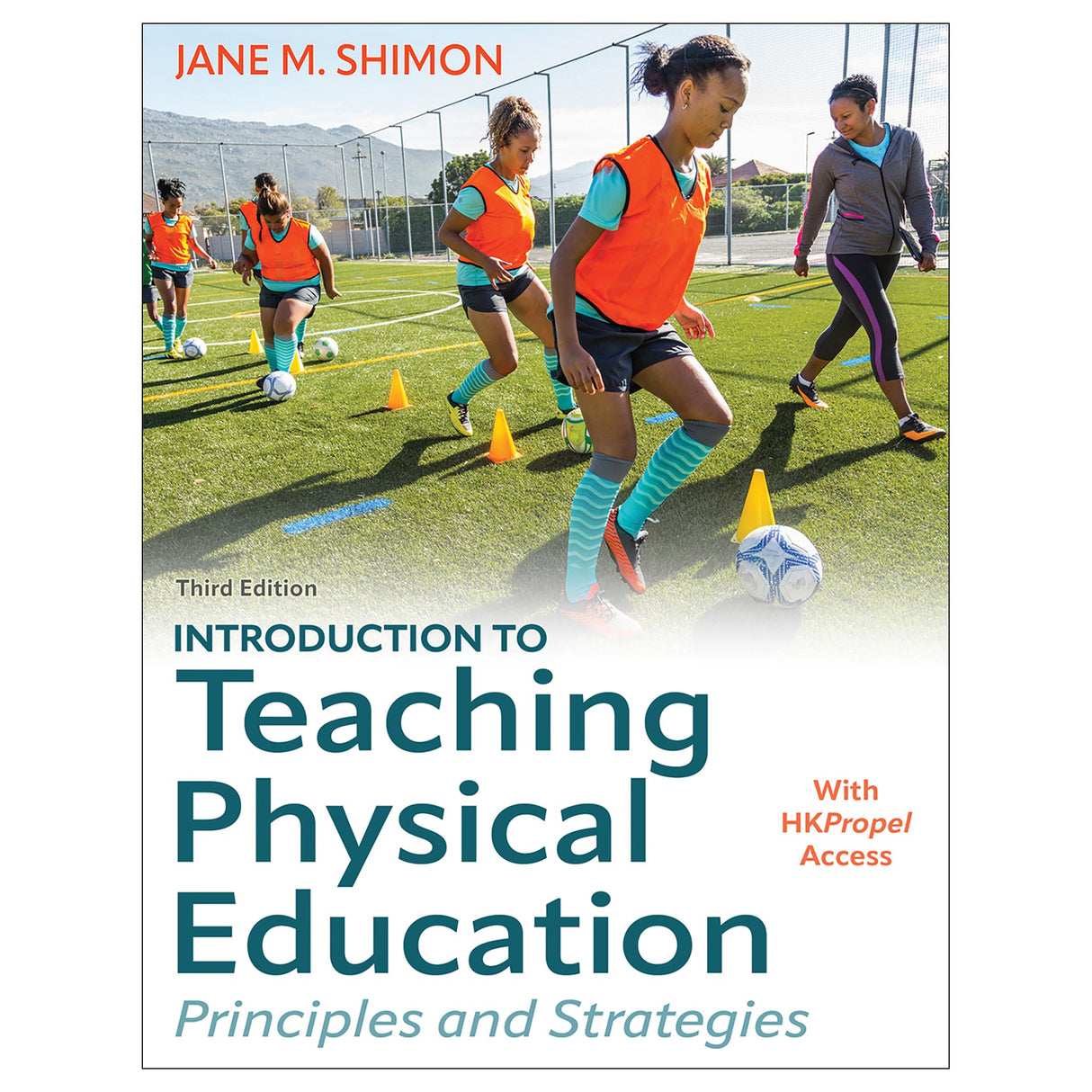Introduction to Teaching Physical Education 3rd Edition Ebook With HKPropel Access
Principles and Strategies
Author: Jane M. Shimon
$73.00 USD

This edition incorporates the revised SHAPE America national physical education standards and grade-span learning indicators for grades pre-K through 12. Other updates reflect the changing nature of education and physical education:
- An increased focus on supporting social and emotional learning (SEL) in physical education
- Information about how culturally relevant instruction supports an equitable, inclusive, and respectful classroom
- Expanded Teachers Talking Teaching sidebars that offer tips from successful teachers based on current challenges and opportunities
- A new video interview with the 2023 National Elementary PE Teacher of the Year, Randy Spring
- Additional material regarding technology use in physical education
In Introduction to Teaching Physical Education, Third Edition, aspiring PE teachers will thoroughly explore physical education topics from both theoretical and practical perspectives. Part I outlines the history of physical education, including the two main systems that served as the profession’s foundation, influential concepts and people, and current national content standards. It also discusses the purpose of physical education and highlights the many teaching and nonteaching duties of physical educators. Part II presents the details for effective teaching of physical education, including the steps to organizing and instructing in the gymnasium. It also looks at motivational theories and how to prevent misbehavior and positively manage student behavior.
In part III, students learn to plan quality lessons, develop safe and successful lessons, and use assessment and rubric design to determine whether outcomes or learning targets are achieved. Part IV affords students insight into current technology issues that can be used to enhance physical education, and it explores the career options available.
Introduction to Teaching Physical Education, Third Edition, will help students gain the knowledge and skills they need as they pursue their entry into the teaching profession, providing them with a springboard to advance in their coursework. This complete but concise text supplies the perfect introduction to the physical education field, covering the essentials in an engaging and informative way as students learn to apply the principles of teaching physical education.
Note: A code for accessing HKPropel is included with this ebook.
Audience
Undergraduate physical education teacher education (PETE) students and those considering majoring or minoring in physical education.Chapter 1. History of Physical Education
The Beginning
Physical Education in the United States
Early American Period: Mid-1700s to 1900
Early 20th Century: 1900 to 1930
Mid-20th Century: 1930 to 1970
Late 20th Century: 1970 to 2000
Early 21st Century: 2000 to Present
Summary
Chapter 2. Purpose, Benefits, and Philosophy
Purpose of Physical Education
National Physical Education Standards
Benefits of Physical Education
Philosophy of Physical Education
Summary
Chapter 3. Duties and Challenges
Teaching Duties and Roles
Nonteaching Duties
Issues and Concerns
Summary
Part II. Teaching Physical Education
Chapter 4. Organization and Instruction
Noninstructional Tasks: Classroom Organization
Instructional Tasks
Content Progressions and Practice Strategies
Teaching Styles
Summary
Chapter 5. Motivation
Motivational Theories
Strategies to Enhance Motivation
Summary
Chapter 6. Behavior Management
Behavior Management Safeguards
Behavior Management Strategies
Summary
Part III. Lesson Planning and Outcomes
Chapter 7. Scope and Sequence
Scope: Pre-Kindergarten (Pre-K)
Scope: Elementary School
Scope: Middle School and Junior High School
Scope: High School
Sequence
Summary
Chapter 8. Lesson Planning
Writing Learning Outcomes (Objectives) for a Lesson Plan
Creating Lesson Plans
Supporting Individual Differences
Supporting Social and Emotional Learning
Summary
Chapter 9. Student Assessment
Terminology
Assessment Options
Types of Rubrics
Rubric Construction
Grading Considerations
Health-Related Fitness Testing
Constructing Written Tests
Summary
Part IV. Beyond the Classroom
Chapter 10. Technology and Resources
Instructional Technology
Online Resources
Summary
Chapter 11. Careers in Physical Education
Alternative School Settings
Other Career Avenues
Summary
Appendix A. Appropriate Practice Guidelines and Instructional Strategies—SHAPE America 2009
Appendix B. Example of Class Policies and Expectations
How do lesson plans fit within a physical education curriculum?
What factors should you consider when developing a grading plan?

View a snippet of an interview with the 2023 National Elementary PE Teacher of the Year
All ancillaries are free to adopting instructors through HKPropel.
Instructor guide. Includes explanations of the student HKPropel activities, case studies, and an interview with the 2023 National Elementary PE Teacher of the Year, Randy Spring. Also provides a syllabus and course outline with chapter-specific files, including chapter overviews, objectives, key terms, discussion questions with recommended responses, and learning activities.
Test package. Contains 330 questions in true-false, fill-in-the-blank, essay and short-answer, and multiple-choice formats. The files may be downloaded for integration with a learning management system or printed for use as paper-based tests. Instructors may also create their own customized quizzes or tests from the test bank questions to assign to students directly through HKPropel. Multiple-choice and true-false questions are automatically graded, and instructors can review student scores in the platform.
Chapter quizzes. Contains ready-made quizzes made up of 10 questions to assess student comprehension of the most important concepts in each chapter. Each quiz may be downloaded or assigned to students directly through HKPropel. The chapter assessments are automatically graded, and instructors can review student scores in the platform.
Presentation package. Features more than 250 PowerPoint slides of text, artwork, and tables from the book that can be used for class discussion and presentation. The slides in the presentation package can be used directly within PowerPoint or printed to make handouts for students. Instructors can easily add, modify, and rearrange the order of the slides.
Instructors also receive access to all student materials in HKPropel. For Introduction to Teaching Physical Education, Third Edition, this includes key term flash cards, case studies, and over 25 online worksheets and lesson plan templates. Plus, an informative interview with the 2023 National Elementary PE Teacher of the Year offers inspiration and teaching tips for aspiring physical education teachers.





